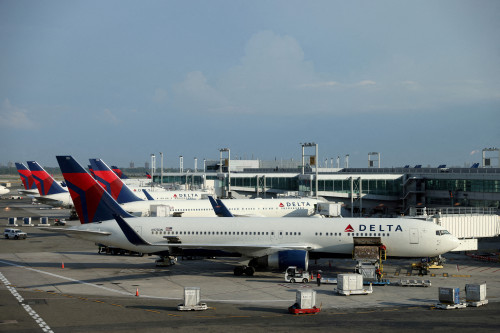By Rajesh Kumar Singh
CHICAGO (Reuters) – President Donald Trump’s trade war has created the biggest uncertainty for U.S. airlines since the COVID pandemic.
With little clarity on how consumers will behave in the face of a potentially worsening economy, carriers are struggling to accurately forecast their business.
While Delta Air Lines and Frontier have withdrawn their full-year outlook, United has offered two different earnings forecasts.
“It kind of really shows a lack of conviction,” said Brian Mulberry, client portfolio manager at Zacks Investment Management, which holds shares of United.
Economists polled by Reuters expect the aggressive U.S. tariff policy to trigger a significant slowdown in the U.S. economy this year and next, with the probability of a U.S. recession over the coming year surging to 45%, the highest since December 2023, from 25% last month.
Since travel spending closely tracks broader economic activity, any recession is widely expected to cut airline revenue.
Carriers have traditionally relied on capacity cuts and cost management to protect their earnings in a recessionary environment. They have already started pulling those levers, but a fluid economic situation means they can ill-afford to slam the brakes hard.
The popular view in the industry is that the present uncertainty is “self-inflected” and could go away overnight if the Trump administration decided to call a truce on tariffs.
The current situation is very different from the pandemic when travel demand collapsed, forcing airlines to go into a cash preservation mode, one industry official said.
In comparison, the bookings have only softened and could bounce back if the broader economic outlook improves. As a result, airlines are wary of taking measures that could hand advantage to their rivals, the official added.
The U.S. domestic market is the best example of this caution. It is currently the softest travel market, with airlines having to stimulate demand with lower fares.
United told investors on Wednesday its domestic unit revenue, a proxy for pricing power, would be negative in the current quarter. Yet, its second-quarter capacity, or the seats available on flights, is estimated to be up 8.2% from a year ago – the sharpest growth among major carriers.
Andrew Nocella, United’s chief commercial officer, said while the company planned to cut unprofitable flying, it was also going to balance market share and financial returns.
COST MANAGEMENT
Mixed economic indicators have only added to the industry’s conundrum. U.S. retail sales and hiring grew at a much stronger-than-expected pace in March even as business and consumer confidence plunged.
Credit and debit card spending per household increased last month from a year ago after posting a decline in February, according to Bank of America, suggesting consumers across most of the country are still spending.
The pullback in travel demand has largely come from lower-income households. Affluent customers are still taking vacations, underpinning the demand for premium travel.
Both United and Delta reported a year-on-year increase in revenue from high-margin premium cabins in the March quarter. A further deterioration in the economy, however, poses a risk to that revenue stream.
“There’s a reasonable chance that bookings could weaken from here,” warned United CEO Scott Kirby.
Airline executives say the industry’s prospects rest on the labor market, which has remained solid. But U.S. Federal Reserve Chair Jerome Powell said on Wednesday Trump’s tariff policies risked driving up inflation and unemployment.
Faced with heightened uncertainty, airlines are focusing on areas they can control such as cost management. They are slashing flights during off-peak travel periods to reduce operating costs.
Delta and United are retiring dozens of older planes ahead of schedule to save on maintenance costs. Delta is also leaning on natural attrition to reduce its headcount.
“As airline managers, we’re excellent in dealing with adversity,” said Delta CEO Ed Bastian. “Right now, it’s hard to know how this is going to play out given that this is somewhat self-imposed.”
(Reporting by Rajesh Kumar Singh; Editing by Alison Williams)





